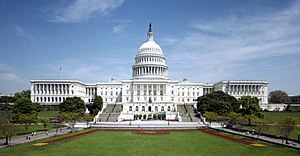 The western front of the United States Capitol. The Neoclassical style building is located in Washington, D.C., on top of Capitol Hill at the east end of the National Mall. The Capitol was designated a National Historic Landmark in 1960. (Photo credit: Wikipedia)
The western front of the United States Capitol. The Neoclassical style building is located in Washington, D.C., on top of Capitol Hill at the east end of the National Mall. The Capitol was designated a National Historic Landmark in 1960. (Photo credit: Wikipedia) President Barack Obama signs H.R. 2751, the “FDA Food Safety Modernization Act,” in the Oval Office, Jan. 4, 2011. (Official White House Photo by Pete Souza) License on Flickr (2011-01-12): United States Government Work Flickr tags: WASHINGTON, DC, USA (Photo credit: Wikipedia)
President Barack Obama signs H.R. 2751, the “FDA Food Safety Modernization Act,” in the Oval Office, Jan. 4, 2011. (Official White House Photo by Pete Souza) License on Flickr (2011-01-12): United States Government Work Flickr tags: WASHINGTON, DC, USA (Photo credit: Wikipedia)An interesting article appeared in the New York Times today discussing new proposed rules from the Obama administration on the relationship between lobbyists and congress. Apparently, these new proposed rules would limit the ability of congress folks to interact with registered lobbyists under circumstances where anything free might be involved such as film screenings, cocktail parties, etc. So, it seems like it would be OK to meet with lobbyists – they just can’t pay for drinks and meals nor could they provide free entertainment. It also seems that if the congressperson is an invited speaker at such an event – that would also be OK. I’m confused – but probably so is anyone else who tries to wade through all this.
I was struck by the article in the Times because it notes that lobbyists are complaining that they would no longer be able to educate congress on the issues important to the lobbyists clients. The fear is that congress will become alienated and distanced from regulated industry to the point where it is no longer able to make rational decisions. It may surprise you to hear that I sympathize (within limits) with this view. For me, a great example is the anti-infectives division at the FDA. They, through congressional pressure and through unreasonably tight restrictions on interacting with industry coming from regulations around conflict of interest, have become completely isolated from the industry that they regulate. This has been an important contributor to the greatest debacle of our century in the discovery and development of new and needed antibiotics. For almost a decade now, guidance documents from the FDA for the development of new antibiotics have required infeasible clinical trial designs. This has increased the regulatory uncertainty for the pharmaceutical industry and has, in a number of cases, led directly or contributed to their exit from the field of antibiotic R&D. I believe that if the FDA had been able to get appropriate advice (in the absence of political pressure from congress) from folks who actually are involved in the development of new antibiotics prior to releasing their guidance documents, they would have understood that their proposed designs were infeasible from the outset. The way the process currently works, the FDA releases a guidance document requiring infeasible clinical trials. There is then uproar from the industry and the Infectious Diseases Society of America. The FDA then reacts (we hope – but this has not yet actually happened) with tectonic speed to revise the guidance such that required trials are again feasible. In the meantime, more companies abandon antibiotics research. Is this a way to conduct business? Of course it isn’t.
My nightmare is that this system becomes the way of doing business in congress. The result will be the passage of idiotic laws that then have to be modified after years of delay. On the other hand, I don’t see why lobbyists should have to provide free meals or drinks to be able to speak to congress folks. I guess this boils down to the question of what it takes for a lobbyist to speak to a congressperson. But I agree that the complete isolation of government from regulated industry is unhealthy and may even be risky.

Good comment. I have visited with people from the Pew Charitable Trusts who have conversations with FDA. It seems independent types (like yourself, Pew) would serve well in helping develop trial design. It is important to recognize conflict of interest, but it seems ridiculous to make meals and drinks out of bounds when talking to Congress.
ReplyDelete